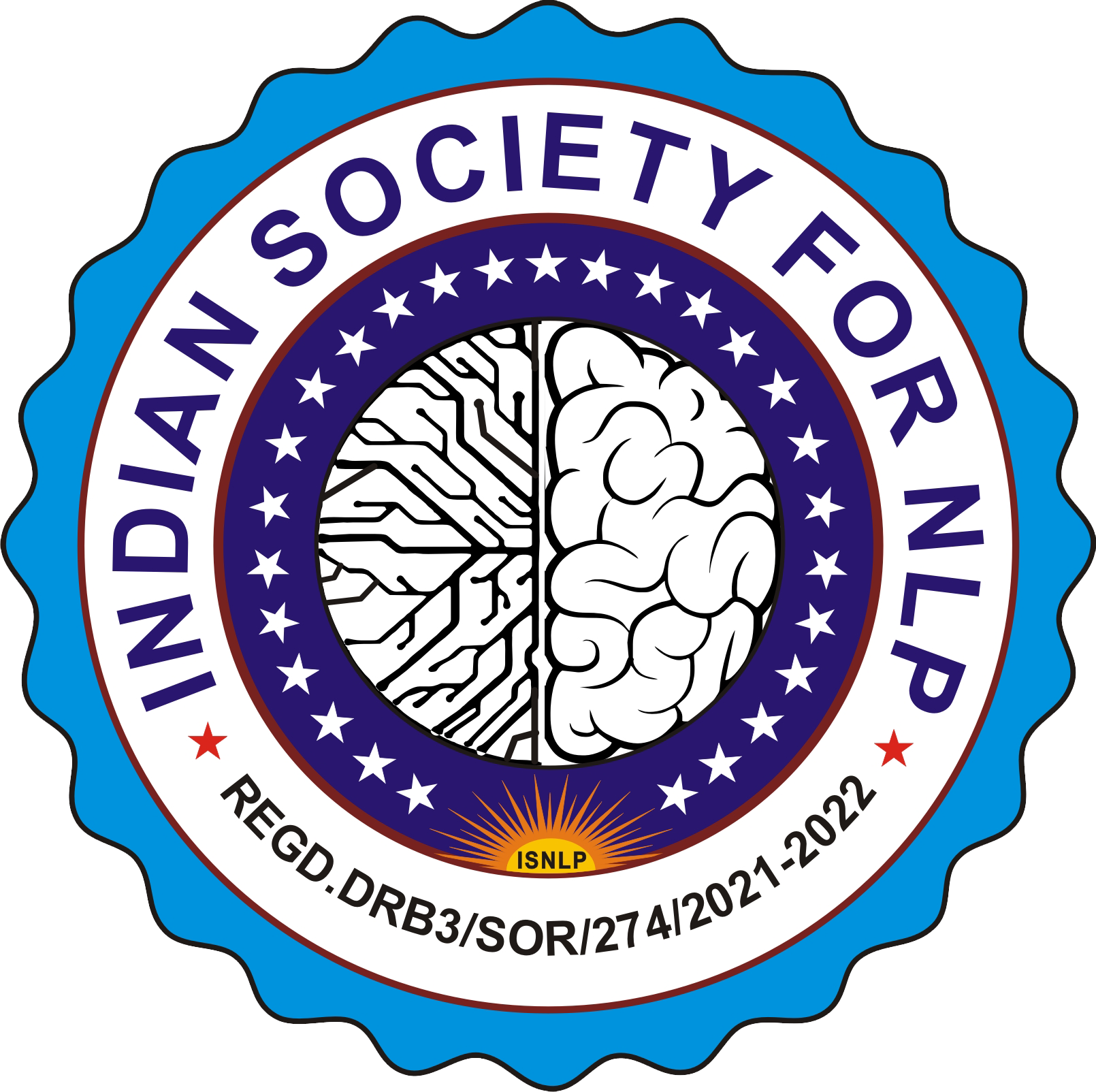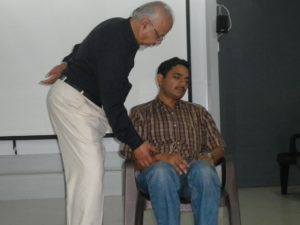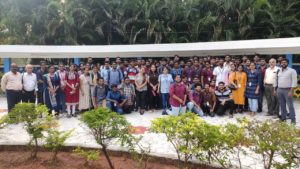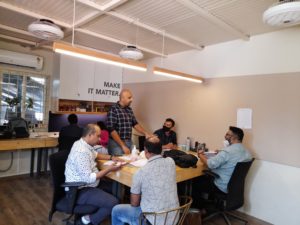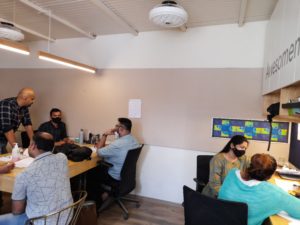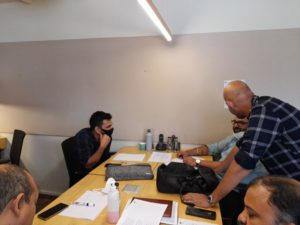Governance Documents
ISNLP Articles of Association
MEMORANDUM AND BYLAWS OF Indian Society for NLP (ISNLP)
#603, Sriven Elegance, Jyothi Nagar, Gottigere,
Bangalore-560083, India.
I. The name of the society shall be “Indian Society for NLP”.
II. The Registered office of the society shall be situated at:
#603 Sriven Elegance, Jyothi Nagar, Gottigere, Bangalore-560083, India.
III. MISSION :
“Indian Society for NLP, hereinafter also referred as ISNLP is committed to furthering the spirit, theory and applications of the Neuro Linguist Programming (NLP) in India and globally, as inspired by the different institutions that facilitate learning of Neuro-Linguistic Programming (NLP), Hypnosis, Psycho-therapy, Coaching, Personal Growth and related human disciplines for applied practices”.
IV. The objectives for which the society is established are:
- To propagate and educate by organizing programs on the salience, tradition, theory and applications of NLP (Nero Linguistic Programming), in India and globally.
- To promote, through its network, associates and members, the understanding and learning of Neuro Linguistic Programming (NLP) and the connected disciplines and methodologies relating to the human processes so as to facilitate individuals, groups, organizations and the community for their excellence.
- To facilitate the study and learning of Nero Linguistic Programming (NLP) and the envisaged process of self-growth and human relations.
- To build professional competency of people for coaching, counseling, training, organizing seminars, conducting conventions etc. for facilitating the learning of Nero Linguistic Programming (NLP) for personal development and professional excellence.
- To network with professional bodies for promoting the objectives.
- To offer professional help to institutions, members and individuals already engaged in similar activity.
- To construct buildings and developing financial assets for ISNLP to promote its objectives.
- To collect, raise and receive grants, subscriptions, donations and gifts in cash or in any kind from general public for all or any of the objectives of the society with or without condition of the donors for a particular objective of the society.
- To purchase, take on lease or in exchange or hire or acquire by gifts or otherwise and hold any movable or immovable property or any rights or privileges that may be deemed necessary or useful for the advancement of the objectives of the society or to form ‘trusts’ for administration of its properties.
- The society is formed with no-profit motive and for non-commercial activities; and none of the office-bearers are paid remuneration for the role as an Office-Bearer from the funds of the society.
ISNLP Bylaws
BYLAWS: RULES & REGULATIONS OF Indian Society for NLP (ISNLP)
#603, Sriven Elegance, Jyothi Nagar, Gottigere,
Bangalore-560083, India.
- The SOCIETY or ISNLP means “Indian Society for NLP”.
- NLP means Neuro-Linguistic Programming
- ‘Board’ means Governing Board.
- ‘KSA’ means the Karnataka Society Act 1960.
- “OFFICE DEFAULT” for a purpose of any provisions in the Karnataka Society Act 1960”, means any office-bearer who is knowingly guilty of any contraventions, failure of refusal or who knowingly authorizes or permits such contravention, failure or refusal.
- ‘Year’ means the official year of the society commencing from 1 st April and ending on 31 st March (financial year).
- ‘VOTES of Two THIRD of THE MEMBERS’ means the votes of at least two-third of the number of members of society present at the general meeting of the society according to its regulations including votes by proxy is allowed under regulations, but a member of the society can appoint his proxy a person who is a member of the society, but not an outsider.
- ‘SEAL’ Means the official seal of the society.
- ‘MEMBER’ shall mean a member of the society.
- “Governing Board” shall mean the management body duly constituted under the rules and regulations of this society and the Governing Board shall be Presided over by The President in all its management responsibilities and the resolutions passed under its vested jurisdiction of the overall management of the society subject to the ultimate repository authority of the General body. The “doctrine of indoor management” shall apply to the authority and functioning of the Governing Board. Signatories to the memorandum will automatically become Governing Members of the Society by remitting a life-Membership fee of Rs.10,000/- each and constitute the first Governing Board. The Governing Board shall have a tenure of three years.
- “Office-Bearers” (“Executive Committee”): Office-bearer means a member of the Governing Board who has been elected by the Governing Board to function as The President, Vice-President(s), Secretary, Joint-Secretary and Treasurer constituting collectively the Executive Committee. There can be more than one Vice-President but not more than three simultaneous role-holders as Vice-President.
- (a) By virtue of the Memorandum and Bylaws, the following signatories to the Memorandum of the Society who are the Golden Members, shall be the first set of Office- Bearers for the initial tenure of three years:-
(1) Mr.V.M.Ramalingam – President;
(2) Mr.Paul George – Secretary
(3) Mr.T.K.Ramesh – Treasurer
(b) Thereafter, forever, The Governing Board, as hereinafter described, shall elect the Office Bearers of the society and the office-bearers will function collectively as the “Executive Committee” to be in charge of the day-to-day administration of the society and the executive committee shall function under the direction and control of The President. - “General Body Meeting” shall mean the meeting of the ‘members’ of all categories of the society.
- “THE MEMBER REGISTER” shall mean the register of the members of all categories of the society.
ISNLP Consent for electronic Transmissions
CONSENT TO USE OF ELECTRONIC TRANSMISSIONS BY MEMBERS OF THE INDIAN SOCIETY FOR NLP (ISNLP)
#603, Sriven Elegance, Jyothi Nagar, Gottigere,
Bangalore-560083, India.
It is important that you sign and return this “Consent to Electronic Communications” form. Information Technology Act, 2000 obliges ISNLP to have it on file before we can communicate with you by email or allow you to vote electronically. Signing and returning this form will assist us in meeting our legal obligations and allow full email and online communication between you and the ISNLP. Please sign the form and scan/email to Secretary@isnlp.in Please follow that up by posting the hard copy with the handwritten signature to ISNLP, #603, Sriven Elegance, Jyothi Nagar, Gottigere, Bangalore-560083, India. Please note that it is your responsibility to keep your email updated online at www.isnlp.in.
INDIAN SOCIETY FOR NLP CODE OF ETHICS AND PROFESSIONAL PRACTICE GUIDELINES
Ethical conduct and standards for training and supervision
Preamble
The ISNLP promotes the highest caliber of ethical conduct among NLP Trainers and Master Trainer across the four levels of NLP Trainings which is Practitioner , Master Practitioner , Trainer & Master Trainer. ISNLP Trainers and Master Trainers have responsibilities to uphold exemplary standards of ethical conduct in all aspects of their work and provide the best possible service to trainees and clients, to earn public trust in certified ISNLP Trainers and Master Trainers and practitioners and sustain public confidence in our rigorous training and certification process. As such, these ethical training standards are aspirational. ISNLP Trainers and Master Trainers are expected to live a principled, good moral life that models these professional ethical principles and standards.
Ethics in training remains an ongoing conversation. Trainers and trainees choose an appropriate course of action, while exercising responsible professional judgement and exemplary ethics and training standards.
ISNLP Ethical principles
Ethical principles are derived from values and are intended to guide how people make relational decisions and behave respectfully toward one another, to promote the well-being, personal development, fulfillment, and growth of individuals and society.
Primary values of ISNLP Trainers and Master Trainers include:-
(a) Respect for the dignity of all human beings;
(b) Recognition of people’s rights to self-determination, to learn from their experience, and to be in charge of themselves, while taking into account the reality of each situation, the laws of their country, and the rights of others; the right to physical health and mental stability;
(c) The right to be free to explore and grow in an environment that enables a sense of security; and recognition of interpersonal mutuality, interdependency with others, and the impact of mutuality on others’ individuality.
ISNLP members should not consider this an exhaustive list. Our primary existential philosophical perspective converges with the values from which our ethical principles have largely been adapted, the United Nations Declaration of Human Rights; these principles and values inform our teaching and consulting services, and direct service to clients in all fields of specialization.
The Ethical principles that can be extrapolated from these guiding values are:
• Responsibility
• Protection
• Respect
• Commitment and fidelity in relationship
• Empowerment
Ethical dilemmas often present overlapping principles and values in different contexts. Instead of a list of proscriptive rules, NLP Practitioners / Master Practitioners / Trainers and Master Trainers are expected to reflectively engage in ongoing conversation with knowledgeable, experienced colleagues to increase their awareness of options and consider the impact of ethical decisions in relation to groups impacted by the training or consultant relationship in the field of NLP.
The ISNLP Code of Ethical Conduct requires that ISNLP Members:-
Consider each value and the ethical principles that derive from it and self-reflect in order to decide what attitude to take and how to behave as a member of the group to which they belong. They will analyze a given situation, consider the influence of ethical principles on their practice, and choose behaviors that take into account a wide variety of factors, including client, self, and environment.
Boundaries and multiple relationships
Multiple relationships and crossed boundaries in psychotherapy are recurrent topics within professional psychology journals, although multiple relationships in training have received little attention in recent transactional analysis literature. Multiple relationships occur when a therapist or trainer engages in more than one relationship with a trainee or client, sequentially or concurrently. Where one person fills the roles of both the therapist and supervisor; these writers advocate for engaged, responsible thinking about the inherent role incompatibilities, ethical contradictions, and ambiguities, as well as the potential benefits within these overlapping roles.
ISNLP Code of Ethical Conduct explicitly addresses sexual and non-sexual boundary violations, and alerts members to protect the professional contract from the pressures of multiple relationships by thinking through the implications with knowledgeable,
professional guidance:-
ISNLP members who are providing contractual services will not exploit a client in any manner, including, but not limited to, financial and sexual matters. Sexual relationships between an ISNLP member and his/her clients, trainees, or supervisees are prohibited.
ISNLP Rules for Candidates seeking Professional Membership
REGULAR RATE Membership Application / Renewal Form
This is a ¨ NEW membership ¨ RENEWAL membership
¨ I will make my payment online OR ¨ I will make a bank transfer OR
¨ Please make the payment for me. My credit card details are below.
PLEASE PRINT CLEARLY. You may also complete this form on your computer. Once complete, email it to us at secretary@isnlp.in. If paying by money order or U.S. check, please send payment to the mailing address below.
CONTACT INFORMATION
Preferred Title (if any) ____________________________________
(i.e., Ms., Mrs., Mr., or Dr.)
First Name ____________________________________
Last Name ____________________________________
Primary Email ____________________________________
Address1 ___________________________________
Address2 _____________________________________________
Address3 _____________________________________________
City _____________________________________________
State _____________________________________________
Postal Code ____________________________________________
Country ____________________________________________
Phone ____________________________________________
CREDIT CARD INFORMATION
Card type
¨ Visa ¨ Master Card ¨ Amex ¨ Discover
Name on Card ______________________________________
Card No ___________________________________________
Expiration (month/year) _____________________________
Security Code _______________________________________
Billing Email (required) ¨ Same as Primary Email
or, if different: ______________________________________
Billing Address ¨ Same as Mailing Address
or, if different:
Address 1 _________________________________________
Address 2 _________________________________________
Address 3 _________________________________________
City _____________________________________
State _________________________________________
Postal Code ________________________________________
Country ________________________________________
MEMBERSHIP LEVEL & ANNUAL DUES (select one)
¨ INR xxxx.xxper year Full
¨ INR xxxx.xx per year Supporting
¨ INR xxxx.xx per year Retired
¨ INR xxxx.xx per year Student*
* Student members must complete a verification form.
DONATION TO THE ISNLP FUNDS
I would like to donate the following amount(s):
INR _______ Talent Scholarship Fund
Making ISNLP membership affordable
around the world
INR _______ Scholarship Grant Fund
Supporting ongoing training in
transactional analysis
INR _______ Eric Berne Fund for the Future
Funding research and the ongoing
development of transactional analysis
INR _______ Annual Dues
INR _______ Donation(s)
INR _______ TOTAL
Job Descriptions for ISNLP Officers and Trustees
President
The president is the chief executive officer of the association, elected by the membership and responsible for presiding over all board of trustees and member meetings. He or she manages the work of the association through the other officers and the office manager. The president has different roles during a 5-year term: one (1) year as president-elect, three (3) years as president, and one (1) year as past president.
Duties of the President:
● To regularly attend and preside over the Governing Board meeting,
● To conduct the business of the society according to rules and regulations,
● To disallow acts which are improper and contrary to rules and regulations of the society.
● He is the primary holder of the purpose of the society by enabling his colleagues in the Executive Committee, Governing Board and all the categories of Members.
● To give reply to the debate so as to decide an issue or to cast a casting vote in case of tie and to carry on correspondence according to need.
● The President can step into the shoes of any other Office-bearer of the society, in case of exigencies such as, demise, cessation, resignation, absence etc.
● The President is vested with authority for all the executive functions, as stated in the Memorandum and Bylaws and by his discretion of prudence. He is the person to sue and be sued on behalf of the society in a court of law or Executive authority of Government.
● President is the public face of the society and as such promote and conserve the reputation of the society by carrying his team of Executive Committee and the Governing Board
● Directs the work of the association in accordance with the bylaws and guidelines;
● represents the association to the public and the professional community;
● recruits and appoints chairpersons and members of subdivisions and committees with the assistance of the officers in charge and subject to ratification by the board.
Specific Functions of the President:
● Plans, chairs, and follows up on meetings of the board of trustees and the executive committee;
● coordinates the work of the divisions, staff, and other working bodies of the association;
● manages association finances in conjunction with the treasurer and office manager;
● manages the budget allotted for the president’s expenses;
● supervises the work of the office manager and staff, and in the absence of the office manager, supervises the work of the staff;
● gives regular performance appraisals and career development guidance to staff;
● participates in planning and carrying out long-range planning activities of the association;
● responds to concerns and needs of members and working groups in the association and delegates tasks as appropriate;
● ensures that there is adequate communication within and among parts of the association and with other national and regional NLP associations around the world as required;
● reasonable assessment of and commitment to the time necessary to fulfil the position;
● attends in-person and telecommunication executive committee and board meetings.
Selection Criteria for the President:
● Is an ISNLP member in good standing;
● has the ability, time, and commitment to serve the ISNLP as chief executive officer;
● has demonstrated ability to show leadership, organize, plan effectively, set goals and objectives, develop action plans, set meeting objectives, and conduct board meetings;
● has experience and skills in managing employees and facilitating participatory management of volunteers by fostering a common vision for the ISNLP and a spirit of service;
● has demonstrated the ability to produce results through others while generating positive support (e.g., negotiate performance expectations, monitor progress, provide feedback, and take appropriate action);
● has demonstrated the ability to work toward common goals as a team member;
● has demonstrated the ability to communicate effectively both orally and in writing;
● has demonstrated ability at win-win negotiating. It is desirable that he or she will have had previous experience on the board of trustees.
Vice President
General Functions of the Vice President –
● To assist the president in the works of the society and to occupy the chair and to exercise the powers and functions of the president in his absence.
● In the event of the resignation of the president and/or new appointment and/or election of the president during the middle of the terms is to be considered, the vice-president will preside over the meeting of the Governing Board and other meetings.
● His responsibilities are co-extensive with that of the President in all its domains.
● Maintains liaison with, advises, and receives the reports of designated committees;
● plans and manages the budget in consultation with the office manager, the finance committee, and the board of trustees;
● functions as the primary liaison between the board of trustees and the standing committees;
● responds to needs expressed by individual members and affiliated organizations, assigning tasks to relevant committees for evaluation and response;
● works closely with ensuring there is development , research , innovation , and professional standards within the organization.
Specific Functions of the Vice President
● Assesses organizational needs;
● follows up on decisions of the board of trustees with appropriate committee chairs;
● integrates the work of the committees to meet the overall concerns, activities, and goals of the organization;
● coordinates with the conference committee, the ethics committee,
● participates in the recruitment of committee chairs with the president;
● prepares budgets and oversees the financial management of committees in the context of organizational needs and priorities;
● serves as an assistant to the president, for whom he or she may carry out specific assignments;
● prepares an annual report on the activities for the executive committee and the board of trustees;
● attends in-person and telecommunication executive committee and board meetings.
Selection Criteria for the Vice President – Operations:
● Is an ISNLP member in good standing;
● desirable to have had previous involvement, preferably as a chair, with a standing committee of the ISNLP or another volunteer professional organization;
● reasonable assessment of and commitment to the time necessary to fulfil the position;
● demonstrated ability to serve in a management and leadership capacity;
● demonstrated ability to organize and plan effectively, set goals and objectives, develop action plans, and set and carry out meeting objectives;
● demonstrated ability to negotiate performance expectations, monitor progress, and provide feedback to colleagues;
● demonstrated ability to communicate effectively both orally and in writing.
Specific Functions of the Joint Vice President :-
● Identifies and solicits revenue-generating projects for the ISNLP , assessing their relevance, profit potential, ethical propriety, and consistency with the mission and purpose of the association;
● coordinates the website committee and the membership committee;
● identifies and establishes means by which the image of and familiarity with the ISNLP and Neuro-Linguistic Programming can be enhanced among professional and lay communities;
● oversees the budget and development of the website and social media platforms and communicates with the team that manages those;
● appoints subdivision managers and project managers and recruits members for volunteer participation in conjunction with the president;
● oversees, coordinates, and supports the work of subdivision managers;
● attends in-person and telecommunication executive committee and board meetings.
Secretary
General Functions of the Secretary:
● To come to the meeting well before time, to put down in writing the proceedings of the meeting, to read the minutes of the previous meeting at the beginning of every meeting and to get them recorded and passed formally by the membership or Governing Members as applicable.
● To enforce the rules and regulations of the society, to get consent of the Governing Board for new work.
● To approve jointly with Treasurer any bill relating to expenditure after proper approval by Governing Board or the authorized authority.
● To manage and conduct the law suits as well as other affair of the society and to sign legal documents and papers on behalf of the society and to appoint, grant leave and dismiss in consultation with the sub-committee the concerned employees.
● To conduct the proceedings of the meeting through vice-president in case of resignation or no confidence motion against president.
● To call the meeting of Governing Board from time to time and issue notice with agenda as per the requirement under the bylaws of the society.
● To circulate the agenda and minutes of the meetings of the board and General body among the respective categories of members.
● To call the Annual general meeting and extra ordinary general meeting by issuing appropriate notice as prescribed by the bylaws and as prescribed by the President and Board from time to time.
● To put proposals before the Governing Board and get it approved for execution. If any member of Governing Board wants to put any proposal before the Governing Board, he / She should submit that proposal to either secretary or president. And such proposal will be put by the secretary in next meeting.
● In case of no-confidence motion against the president or resignation submitted by the president, Vice-President will preside over the meeting duly convened by the Secretary and/or joint secretary.
● Oversees and is responsible for a full and complete record of the proceedings of the board of trustees;
● Assists the president in setting agendas for board and executive committee meetings
● Setting up the logistics of meetings both in person and online;
● Assists the president in ensuring that the official business of the association is conducted in accordance with the bylaws and guidelines;
● oversees the legal aspects of the operation of the association in consultation with the bylaws committee;
● supervises the maintenance of the association’s records;
● manages committees responsible for governance of the association;
● provides administrative support to the president and executive committee;
● communicates with board members and outside parties as necessary and appropriate.
Specific Functions of the Secretary:
● Takes the minutes of executive committee and board of trustees meetings; makes these available online once they are approved;
● ensures good record keeping of all minutes and relevant documents;
● informs the president on matters arising from the minutes and carries out any follow-up asked for by the president;
● works with the ISNLP staff as required throughout the year and specifically to prepare the annual board packet;
● monitors and makes recommendations to the board concerning legal aspects of the operation of the association in an international environment, including matters affecting members’ rights;
● oversees the development and recording of changes in organizational structure and procedures of the association, including the guidelines and bylaws;
● manages the bylaws committee and the nominating committee;
● ensures that minutes from standing committees are filed with the corporation records;
● undertakes any tasks prescribed to this office by the trustees;
● serves on the nominations committee and other committees as needed;
● helps facilitate the award nominations ISNLP Service Award;
● attends in-person and telecommunication executive committee and board meetings.
Selection Criteria for the Secretary:
● Is an ISNLP member in good standing;
● desirable to have previously served on the ISNLP board of trustees or a standing committee;
● reasonable assessment of and commitment to the time necessary to fulfill the position;
● a responsive correspondent;
● has demonstrated interest in the effective running of the board of trustees and the association;
● has a good understanding of the ISNLP bylaws and guidelines;
● has a high level of computer and internet skills and the time to fulfill the many functions of this role.
Treasurer
The treasurer is an elected officer of the association who serves as a member of the board of trustees and the executive committee and as chairperson of the finance committee.
General Functions of the Treasurer: Oversees all financial operations of the association.
Specific Functions of the Treasurer: Guides the executive committee and the board of trustees in determining the annual budget; provides guidance on day-to-day decisions related to the expenditure of funds according to the budget when requested by the president or the office manager; consults with the president and staff on needs that occur outside the budget; helps develop proposals for the board of trustees with regard to special needs; manages the finance committee; prepares easy-to-understand reports that interpret the financial status of the organization to the board of trustees; assists other volunteer leaders in developing and following budgets; reports quarterly to the board of trustees and annually to the membership on the financial status of the association; assists the executive committee and board of trustees to formulate 3-year plans for use in long-range planning for the association; attends in-person and telecommunication executive committee and board meetings.
Selection Criteria for the Treasurer: Is an ISNLP member in good standing; ideally will have served as a volunteer in the ISNLP, preferably on the finance committee or as a committee chairperson or trustee; reasonable assessment of and commitment to the time necessary to fulfill the position; background in financial management or experience in the management of voluntary associations or businesses; accessible for consultation; able to communicate financial and policy matters effectively; able to interpret financial documents and develop financial plans; strong financial training,
business experience, or prior experience as a treasurer is desirable.
Regional Representatives
Regional representatives are at-large trustees nominated and elected by members within a designated geographic area.
General Functions of Regional Representatives: Fulfill the dual responsibilities of representing the interests of all members as well as the interests of members residing in a geographic region; serve the interests of regional members by maintaining contact with them and informing them of relevant projects; contribute to the promotion of transactional analysis in the geographic region they represent. Specific Functions of Regional Representatives: Attend meetings of the board of trustees and respond to matters arising in between board meetings; attend to the requests, suggestions, and needs of regional members and present this information to the board of trustees; serve on and assist the membership committee by contacting expired members to encourage them to renew; work on committees to accomplish specific tasks as needed; serve on committees and participate in communications relevant to matters arising in between meetings of the board; coordinate with each other to generate ideas and share best practices in service of their region; attends in-person and telecommunication board meetings.
Selection Criteria for Regional Representatives: Are ISNLP members in good standing; reasonable assessment of and commitment to the time necessary to fulfill the position; ideally will have served for one year or more on at least one 6 ISNLP committee or in an equivalent position in another TA organization; have the ability to serve the ISNLP as a whole while giving particular attention to the region they were elected to represent.
NOTE FOR ALL POSITIONS: Any trustee who does not attend three successive board of trustees meetings will be disqualified from serving on the board, and his/her position will be declared vacant unless the trustee has given reasonable prior notice of inability to attend, or the trustee requests a leave of absence not to exceed 30 days, or the trustee suffers from an illness or disability that prevents him/her from attending meetings and the board waives the automatic disqualification, or the board, upon good cause shown, agrees to reinstate the trustee who has missed three successive meetings(see the ISNLP Bylaws). Should there be any conflict between these job descriptions and the association bylaws, the language of the bylaws will prevail.

How could ISNLP help you?
Upcoming Events
- There are no upcoming events.
